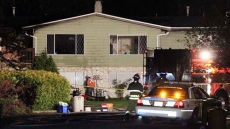PRINCE RUPERT, B.C. — The family of a British Columbia mother who killed herself and her severely autistic son is hopeful that an inquest will bring something positive out of the tragedy, says an advocate.
Angie Robinson and her 16-year-old son Robert were found dead in their Prince Rupert home in April 2014, following the mother's desperate struggle to take care of him.
"It's a terrible thing to feel that your only option is to commit suicide and murder your son," said Faith Bodnar, executive director of Inclusion B.C., a disability advocacy group.
"There's a level of desperation there that is pretty unfathomable and it didn't have to happen," she said Friday.
The BC Coroners Service announced this week that an inquest will be held into the deaths, though a date has not yet been set.
Bodnar has been working with Robinson's loved ones for the past year and said they hope the inquest will lead to better resources for families so a similar outcome can be prevented.
She said Robinson's repeated cries for help went unanswered and she didn't have access to the respite care she needed.
"There are many families across the province who are struggling in silence, who are struggling on long wait lists and who are being denied access to the services they need."
Children's Minister Stephanie Cadieux said in an emailed statement that she welcomes the inquest and will co-operate fully with the coroner.
She said B.C. is the only province that has a no-wait list policy for families to access autism funding once their child has been diagnosis.
Families with children under six are eligible for up to $22,000 a year, while those with children between age six and 18 are eligible for up to $6,000 annually, she said.
Cadieux added that a range of services in Prince Rupert include a newly introduced "early childhood development consultant" who helps social workers in the north plan for a child's specific needs.
Children and youth representative Mary Ellen Turpel-Lafond said there are many unanswered questions about Robinson's case, including why her son was at home instead of at school.
She said Robinson had so little support that she wound up going to the hospital repeatedly to get strong medications, which she eventually used to kill herself and her son.
"Providing a lot of medication as a way to manage a child's deteriorating behaviour, that's a method and a technique that we're using in our health-care system that we need to step back and look at carefully," Turpel-Lafond said.
"I think it's going to be important for the inquest to hear from the doctors who prescribed that medication and from others who were interacting with mom in an emergency setting ... as she struggled to find a community of support and care for her son."





